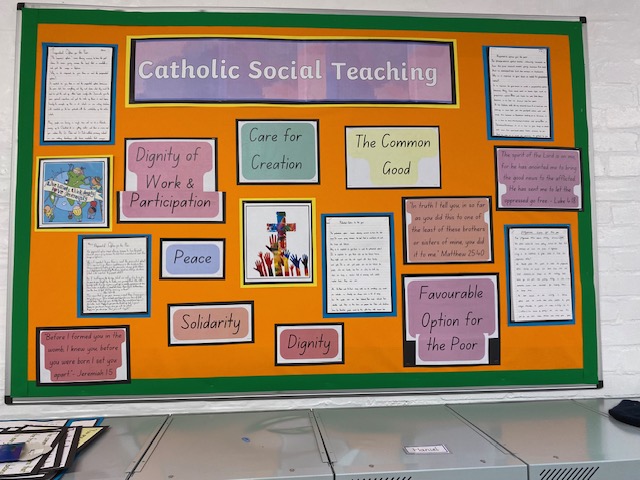Catholic Social Teaching (CST) is based on Scripture, Tradition and Church teaching, as given by Popes, Bishops and theologians. It provides a set of ideas that helps us consider how we should communicate with others.
‘Dear young people… The Lord wants to turn your hands, my hands, our hands, into signs of reconciliation, of communion, of creation. He wants your hands to continue building the world of today.’ Pope Francis
At St Peter and St Paul, we use ‘Rooted in Love’ resources from Caritas to help deliver our Catholic Social Teaching lessons. Our teaching aims to educate our children not just in global issues of poverty but to gain a better understanding of social justice issues in our community.
The ‘Caritas in Action’ programme covers key learning outcomes for the Foundation Stage and Key Stages 1 and 2 through a series of six core themes, which are underpinned by the social teachings of Catholic Church.
Theme 1: Care for Creation
The world that God created for us has been entrusted to everyone, and as stewards of the entire planet, we are responsible and accountable to God. The world has been given to us as a gift, which we must enjoy and preserve so that future generations can do the same. Caring for creation expresses our love and respect for its Creator.
Theme 2: Preferential Option for the Poor and Vulnerable
Society is judged on how it cares for the poor and vulnerable – our brothers and sisters. We read in scripture that God is especially concerned about the downtrodden, destitute, defenceless, and those thrust to the outskirts of society. The Church invites us to respond to the cry of the impoverished and prioritise their needs. This preferential treatment of the poor and vulnerable must be demonstrated in our daily lives.
Theme 3: Solidarity and Peace
We are all People of God, one family. As a result, what happens for one individual has an impact on everyone, locally, nationally, and internationally. Solidarity is centred on the pursuit of peace and fairness. Our love for all motivates us to work for a peaceful and just society in which everyone gets a fair share of the resources required for a sustainable life and equal possibilities for growth and development. Everyone’s dignity is honoured.
Theme 4: Community and Participation
The human individual is both sacred and social. How society is constituted, whether socially, economically, legally, or politically, has a direct impact on the dignity and growth of each individual and community. The family need to be nurtured and strengthened. Every person has the right to work in order to provide for themselves and their families, as well as to contribute to the common good.
Theme 5: The Dignity of Workers
Work allows us to continue to participate in God’s creation. Work provides dignity to life and must be carried out in accordance with workers’ basic rights. Everyone has the right to productive employment, fair and reasonable wages, and the ability to form and join a union. The economy must be managed so that it meets the needs of the people.
Theme 6: The Dignity of the Human Person
Every human person is created in the image and likeness of God. Therefore, every person’s life and dignity must be respected and supported from conception until the end of their natural life on earth.





